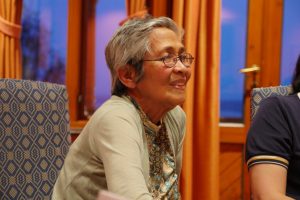Socio-economic reforms and political reforms necessary to achieve lasting peace
“Julie has been ready with SER [social and economic reforms] for a long time,” commented Jose Maria Sison of his wife. This was expressed by other members of the National Democratic Front of the Philippines (NDFP) negotiating panel as well.
 Julieta De Lima is the Chair of the Reciprocal Working Committee on Social and Economic Reforms (RWC-SER) of the NDFP.
Julieta De Lima is the Chair of the Reciprocal Working Committee on Social and Economic Reforms (RWC-SER) of the NDFP.
“We have long wanted to alleviate the plight of the people. We are open to reforms under this kind of system because we want to lift the people from poverty,” said De Lima.
Salient parts of the SER include land reform, national industrialization and betterment of workers’ welfare, social services and education among others.
THE RWC-SER met in the afternoon of August 23 to talk about schedules of their meetings, outline and planned activities. The substantive agenda on social and economic reforms is next to be negotiated by two parties, as per the framework set by The Hague Joint Declaration of 1992.
“We are ready to give them our draft outline, but they [Government of the Republic of the Philippines or GRP] do not have a draft yet. So the exchange would happen in our October meeting,” said Julie De Lima.
The RWC-SER agreed to meet between October 19 and 30 of this year. It will only be the third meeting of the RWC-SER since the peace talks started.
Bilateral discussions on the SER halted after peace talks between the NDFP and the Government of the Republic of the Philippines (GRP) broke down in 2004. The 2011 resumption of formal talks under the Benigno Aquino III presidency did not also reach discussions on the SER.
“We [NDFP and GRP] have already agreed on the principles in 2001, save for two that they had contentions then. But everything else was okay,” recalled De Lima.
The two matters that the GRP contended in 2001 was the use of the term “indigenous peoples” instead of the NDFP-proposed “national minorities.”
The GRP also wanted to use “industrialization” instead of the NDFP’s “national industrialization.”
“The term “national” is important to us because we use it to mean that industrialization should be for the people, not just for profit-taking by foreign capitalists. All the industrialization they say we have now made us an exporter of goods and provider of services. We want a self-reliant economy,” explained De Lima.
Both parties agreed to strive to come up with a complete draft six months from the meeting. The draft agreed by two parties would then be submitted to their principals for approval.
“As far as we [NDFP] are concerned, [GRP and NDFP] have almost completely agreed on the principles of the SER,” said De Lima.
The NDFP first submitted their draft of the SER to the GRP in 1998, upon completion of the agreement on the first substantive agenda, the Comprehensive Agreement for the Respect of Human Rights and International Humanitarian law (CARHRIHL). It was created from consultations with “revolutionary forces, NDFP consultants and the Filipino masses.”
“We have been revising, updating and completing it a few times since it has been drafted a long time ago. We continue to work on the part on national industrialization,” relayed De Lima.
“What we put in the SER are points acceptable even to the Philippine constitution and even the Universal Declaration of Human Rights, so we are expecting that we won’t have a tough time with the SER. But on our part, we also build on the socialist aspirations of the people,” said De Lima.
The Joint Monitoring Committee (JMC) met as well to set a meeting where they can talk about the revitalization and operationalization of the committee. The JMC was set up since 2004 as part of the implementation of the CARHRIHL. Prior this meeting, the JMC was last convened in 2011.
The Reciprocal Working Groups for Political and Constitutional Reforms and for End of Hostilities and Disposition of Forces also met. They agreed to meet in October.
The Panels agreed to fast-track the peace negotiations. Different working committees, working groups, sub-committees and sub-groups will be formed to accelerate the work on the drafting of the proposed agreements on socio-economic reforms and political reforms. If agreements are forged on such reforms then it would bring the country closer to the attainment of a just and lasting peace. #
